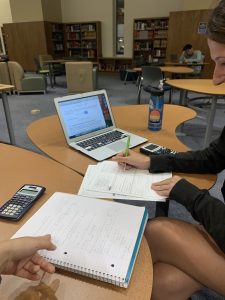Peer Studying with Peer Tutors!
By Lucia and Natalie
While studying alone can ensure that you have your own understanding of a subject, sometimes it’s more helpful (and more fun) to study with a friend. Here is how two peer tutors study together effectively by setting clear expectations about what they want to accomplish in a study session.
Studying Harder and SMARTer with Friends (Lucia)
For some people, learning becomes easier with other students because you can bounce ideas back and forth and get everyone on the same page about something. In fact, my friend (and fellow peer tutor) Natalie and I often find ourselves wanting to study together because we are in the same major and take almost all of the same classes. It was especially helpful to have a friend to review with during remote learning, which is when we met. In Fall 2020, we reached out to each other during the first week of classes intending to discuss the lecture material. This connection kept us on top of our work while giving us a peer to relate to within the course. As time went on, we became friends as we chatted both about our course content and about our lives.
However, we always made sure that we knew when to focus on class versus other topics of conversation. This keeps our study sessions productive and now that we are back in person, it is easier than ever to work with each other. We started off working together by asking questions about specific parts of assignments rather than relying completely on each other to study or complete an assignment. Now that we are in person, we have kept this same framework where we begin studying on our own but will ask questions when we are together. We definitely prefer to use physical pencil and paper instead of Zoom calls, texts, and Google docs, which can be hard to manage when there is too much information.
We find when studying together that it’s important to set expectations before diving in. For us, a study session should be on topic and have a goal which is attainable within the period that you plan to study. Personally, we are more comfortable studying with friends who hold us accountable and do not become a distraction to the work, because ultimately everyone wants to come out of the session with more confidence in the material.
One way we make sure everyone is on the same page in a study session is to adapt our goals into SMART goals, which stands for Specific, Measurable, Achievable, Realistic, and Time-bound. For example, if we have a statistics exam, we may set a shared SMART goal such as: “In our 3 hour study session (realistic, time-bound), we will attempt the practice exams individually (measurable) in test-like conditions (specific) before reviewing the answers together (achievable).” We are able to create test-like conditions by working silently with no technology or collaboration by booking study rooms with plenty of table space and putting our notes away. After taking the practice, we are able to review the questions together and see if our answers match. Sometimes there are topics that one of us can explain better to the other and sometimes there are topics that we both need to review! Since we are aware of the plan, we can use our time efficiently and effectively. These shared goals might be different from our individual goals which could focus more on understanding a certain concept, but in a group setting it’s helpful to know we are all on the same page about what we want to review.
A Tale of Two Students (Natalie)
Studying with friends can be super useful! I find it most helpful when I get stuck on a question that I am able to quickly turn to Lucia and ask her if she understands it and if she could explain it to me. While studying for our math test, Lucia and I would individually work on practice tests and when we got stuck we would ask each other how we worked out problems. I personally prefer this method of studying over one that is too collaborative; I prefer to work alone and check in with each other occasionally rather than study all the material out loud and together. This allows for more self-pacing and prevents one of us from feeling like we are teaching the other. Knowing that we are “at the same level” prevents us from feeling like our study sessions have a teacher-student dynamic. As Lucia stated, being aware of each other’s study expectations beforehand prevents one of us from getting frustrated at the other or for using time ineffectively.

Studying with a friend can also be reassuring. It is nice for me to know that we both know and studied similar material and are at the same level of preparedness for the upcoming assessment. I also find myself staying more on track when I am with a friend; having the social pressure of others prevents me from picking up my phone or playing on my laptop like I would if I was alone. By setting expectations early on of what we want to accomplish, we can quickly pivot back when we get distracted by saying something as simple as “Let’s get back to work” or “I think our study break is coming to an end”. The accountability from a peer can make a study session more productive than working by myself because I want to make sure that I am contributing equally to our study sessions.

Studying with friends is not without its challenges, however. It can be easy to get distracted and end up chatting more and hanging out than productively studying. It is also easy to get frustrated if one of us feels like we are spending more time explaining things to the other person and not receiving any help back. I know it can be a different type of challenge when you are already friends with someone before you have a class with them. I think this is when it is important to do as Lucia said and set study expectations with them. It is also ok to set boundaries in your friendship and determine that you all do not approach studying the same way and it would be better for your friendship if you did not try to study for the class together.
The Moral of the Story (Lucia and Natalie)
Don’t be afraid to take that first step of saying hello to a classmate or asking to study together. We had classes together before switching online, but became friends after reaching out to each other on GroupMe about a class assignment. From there, we were able to exchange numbers and work through the problems together. We started off by texting mostly about classes and homework, but then were able to build our friendship beyond that and get to know each other. Chances are that you share common interests with other people in your classes, so studying together can be a great way to make friends!
While studying with others varies for everyone, we like using these methods to ensure that we use our time productively. For us, having someone by our side while reviewing for an exam can be useful for clarifying concepts and asking questions, and we are careful not to spend too much time doing other things during the time we’ve scheduled for studying. Setting expectations, boundaries, and goals how we make sure we get what we want out of a study session.

This blog showcases the perspectives of UNC Chapel Hill community members learning and writing online. If you want to talk to a Writing and Learning Center coach about implementing strategies described in the blog, make an appointment with a writing coach, a peer tutor, or an academic coach today. Have an idea for a blog post about how you are learning and writing remotely? Contact us here.

